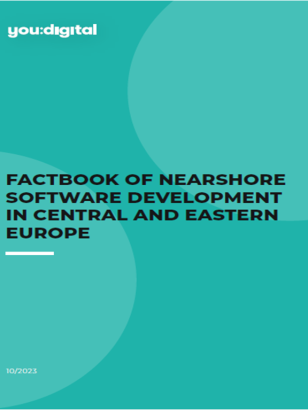Hire ASP.NET Developers from Central Europe
Hire senior remote ASP.NET developers with strong technical and communication skills for your project




Hire YouDigital ASP.NET Developers
Tell us more about your needs
Discovery call to better understand your exact needs
Schedule interviews
Meet and decide on a tech talent
Start building
Hire and onboard the talent
ASP.NET Use Cases
-
Web Applications:
ASP.NET can be used to create a wide range of web applications, from simple websites to complex enterprise applications.
-
Web Services:
ASP.NET provides a powerful set of tools for creating web services that can be accessed by other applications over the internet.
-
Web APIs:
ASP.NET can be used to create web APIs that can be used to access data and perform actions on a server.
-
E-Commerce Applications:
It can be used to build online stores and shopping carts with secure payment gateways, inventory management, and other features.
-
Intranet Applications:
ASP.NET can be used to build internal web applications for companies such as human resources management systems, employee portals, and document management systems.
-
Mobile App Backend:
It can be used to create a backend for mobile applications, with support for RESTful API and JSON data handling.
-
Cloud-based Applications:
ASP.NET can be used to create cloud-based web applications that can scale to handle large amounts of traffic and data.
-
Reporting and Data Visualization:
It can be used to create reports and dashboards with data visualization and business intelligence features.
-
Social Networking Platforms:
ASP.NET can be used to build social networking platforms and communities with features such as user profiles, groups, and messaging.
Top Skills to Look For in an ASP.NET Developer
-
Strong knowledge of the C# programming language and the ASP.NET framework.
-
Experience with web development concepts, such as HTML, CSS, JavaScript, and web standards.
-
Familiarity with web development frameworks such as AngularJS, ReactJS, and VueJS.
-
Experience with database management systems, such as SQL Server and Entity Framework.
-
Strong debugging and problem-solving skills.
-
Knowledge of Git and version control systems.
-
Experience with web services, including RESTful and SOAP-based architectures.
-
Understanding of web security principles, such as encryption, authentication, and authorization.
-
Experience with cloud-based platforms, such as Azure, Amazon Web Services (AWS), and Google Cloud Platform (GCP).
-
Familiarity with Agile software development methodologies
-
Knowledge of Web API development and Integration with other services using technologies such as WebSockets and SignalR.
-
Understanding of Asynchronous programming and multithreading concepts.
-
Experience with or understanding of containerization and orchestration technologies such as Docker and Kubernetes.
-
Good knowledge of testing, debugging and performance optimization techniques.
-
Strong communication skills to work with cross-functional teams and stakeholders.
Would you need a similar type of tech talent?
Our vast resource network has always available talents who can join your project.
ASP.NET Interview Questions
– WebForms uses a Page Life Cycle and events (like button clicks). MVC uses a pattern-based separation of concerns with Models, Views, and Controllers.
– WebForms has ViewState for maintaining state, whereas MVC is stateless.
– WebForms uses master pages for layout, while MVC uses Layouts.
– The request is received by the Global.asax and passed to the appropriate controller.
– Controller determines the appropriate action to handle the request.
– Action processes and returns a particular type of ActionResult (View, PartialView, Redirect, Content, etc.).
– Finally, the response is rendered on the client side.
– TempData retains values for the duration of a single request but can be persisted for an additional request.
– ViewData is a dictionary object that stays during a single request-response life cycle.
– ViewBag is a dynamic wrapper around ViewData.
– ActionResult is an abstract class representing a command to produce a result.
– ViewResult is a derived class of ActionResult that renders a view to the response stream.
ASP.NET offers various session management techniques like InProc, StateServer, and SQLServer. InProc stores session state in memory, making it faster, whereas StateServer and SQLServer store it out-of-process, suitable for web farms.
Dependency Injection is a design pattern where objects receive their dependencies from external sources. ASP.NET Core has built-in support for DI, promoting a decoupled design, ease of testing, and separation of concerns.
– Razor Pages is a page-focused framework for building dynamic web content. It simplifies the code by co-locating the view and its logic.
– MVC separates concerns into Models, Views, and Controllers.
Filters are custom classes executed during an action’s execution pipeline, e.g., Authorization filters, Action filters, Result filters, and Exception filters.
Exceptions can be handled using custom error pages, the “HandleError” attribute, or overriding the “OnException” method in a controller.
It’s an optional file that handles application-level events, such as “Application_Start”, “Session_Start”, and “Application_Error”.
Bundling combines multiple files into a single file, reducing HTTP requests. Minification reduces the size of the file by removing unnecessary characters.
Entity Framework is an ORM that allows developers to work with relational data using domain-specific objects. The Code First approach allows developers to define model classes first, and the database gets created/updated based on these models.
Web API is a framework for building HTTP-based services. Unlike traditional web services (ASMX), it can produce different content types like JSON, XML, and supports RESTful patterns.
CORS is a security measure imposed by browsers. To enable CORS in Web API, you can use the “EnableCors” attribute on controllers or actions.
Middleware components handle requests and responses, forming a pipeline. Each middleware can either pass the request to the next component or short-circuit it. Examples include authentication, routing, and logging.
